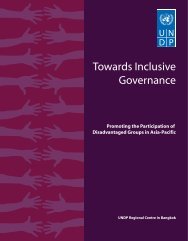Lessons Learned From Rights-Based Approaches in ... - HRBA Portal
Lessons Learned From Rights-Based Approaches in ... - HRBA Portal
Lessons Learned From Rights-Based Approaches in ... - HRBA Portal
You also want an ePaper? Increase the reach of your titles
YUMPU automatically turns print PDFs into web optimized ePapers that Google loves.
Box 1: Procedures and Systems that Hamper Access of Land <strong>Rights</strong> by Poor and<br />
Vulnerable Groups<br />
The systems of land settlement, registration and management that have resulted <strong>in</strong><br />
disenfranchisement of the poor are as follows 8 :<br />
i) Land Settlement: There have been a number of settlement operations, the<br />
procedures of which have contributed to <strong>in</strong>consistencies and errors <strong>in</strong> the record<strong>in</strong>g of<br />
rights. These <strong>in</strong>clude:<br />
• Creation of the orig<strong>in</strong>al record of rights by the Cadastral Survey (1888–1940) - many are<br />
still accepted as evidence by Bangladeshi courts;<br />
• The conduct<strong>in</strong>g of the State Acquisition Settlement <strong>in</strong> East Pakistan <strong>in</strong> 1956–64 - this<br />
concentrated on revis<strong>in</strong>g the record-of-rights, but without full-scale correction of exist<strong>in</strong>g<br />
village maps. Many records were handwritten, lead<strong>in</strong>g to large-scale forgeries and tamper<strong>in</strong>g.<br />
Large areas of khas land ended up be<strong>in</strong>g allotted to the rich;<br />
• The start<strong>in</strong>g of a Revisional Settlement <strong>in</strong> 1965–66 to rectify the above problems - there are<br />
however conflict<strong>in</strong>g reports as to how near to full coverage the Settlement achieved;<br />
• The launch<strong>in</strong>g of a Zonal Settlement operation <strong>in</strong> 1984 to undertake survey and settlement<br />
operations <strong>in</strong> 22 district headquarters simultaneously. However, budgetary constra<strong>in</strong>ts<br />
impeded this process and the scope of work was reduced to 5 districts. The work is still<br />
ongo<strong>in</strong>g. The World Bank estimates that records of rights for the entire country will be<br />
available by 2015–20 (by which time the contents of this work will be obsolete).<br />
ii) Land Registration: Land registration merely records isolated transactions. It does<br />
not prove titles, validates the transactions or even give the registration officer the<br />
authority to verify the authenticity of the deeds. The absence of a system of<br />
simultaneous mutation and registration <strong>in</strong>creases opportunities for produc<strong>in</strong>g false<br />
deeds for multiple transfers of both private and Government khas lands.<br />
iii) Land Records’ Management: Some of the confusion <strong>in</strong> land rights system stems<br />
from the production and ma<strong>in</strong>tenance of different records for the same piece of land.<br />
At present, there are three sources of records:<br />
• Registers kept under the Registration Act of 1908 and ma<strong>in</strong>ta<strong>in</strong>ed by the M<strong>in</strong>istry of Law;<br />
• Records of rights ma<strong>in</strong>ta<strong>in</strong>ed by the Assistant Commissioner (Land);<br />
• Publication of results of settlement and revisional settlement operations – this task is the<br />
responsibility of the Directorate of Land Records and Surveys.<br />
This division of responsibilities for produc<strong>in</strong>g the <strong>in</strong>itial record of rights and<br />
ma<strong>in</strong>ta<strong>in</strong><strong>in</strong>g them over time results <strong>in</strong> <strong>in</strong>accurate and <strong>in</strong>complete records; moreover,<br />
these records are rarely updated. F<strong>in</strong>ally, along with denial of access to Government<br />
khas land, (pr<strong>in</strong>cipally either because the land has not been surveyed, has been<br />
<strong>in</strong>correctly surveyed, is under dispute or has been illegally occupied), the poor also<br />
face problems of prov<strong>in</strong>g how “poor” they are. Def<strong>in</strong>itions of who is landless and<br />
qualifies for the purposes of settlement of khas land have undergone many changes<br />
over the past decades, breed<strong>in</strong>g further confusion and allow<strong>in</strong>g officials to exercise<br />
discretion that have proved detrimental to the poor.<br />
8 Ibid.<br />
18



